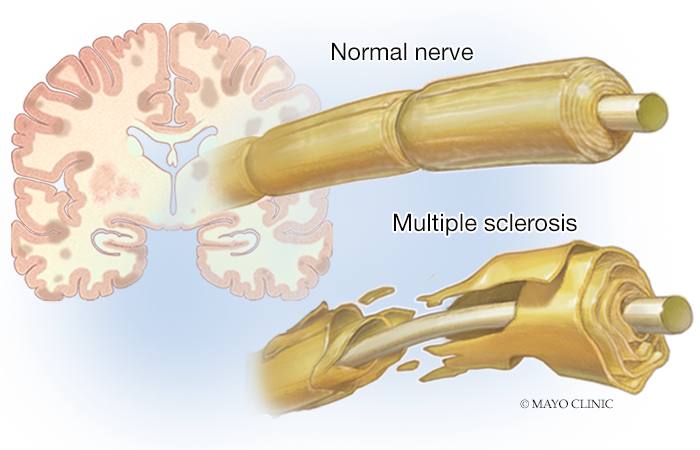-
Mayo Clinic Q&A podcast: Advances in managing MS

An estimated 2.8 million people worldwide are affected by multiple sclerosis (MS), a potentially disabling disease of the brain and spinal cord. In this disease, the immune system attacks the protective covering around the nerve fibers.
"Multiple sclerosis — the term means multiple scars — is a disease that leads to damage of the central nervous system, which is the brain, the spinal cord and the optic nerve," explains Dr. Eoin Flanagan, a Mayo Clinic neurologist.
Signs and symptoms of MS vary widely. Some people with severe MS may lose the ability to walk independently or at all, while others may experience long periods of remission without any new symptoms.
Most people with MS have a relapsing-remitting disease course. They experience periods of new symptoms or relapses that develop over days or weeks and usually improve partially or completely. These relapses are followed by quiet periods of disease remission that can last months or even years.
While there is no cure, treatments can help modify the course of the disease and manage symptoms.
"In the last five to 10 years, we really have strong medications that can keep MS very quiet," says Dr. Flanagan. "We're hopeful that will prevent a lot of the long-term damage that patients used to get in the past where after many years of having an MS diagnosis they may struggle with walking or have additional disability that would develop from those scars. And I think with these new medications we're going to be able to stop MS in its tracks. So it's a really hopeful time for all of our patients with MS."
In addition to medications to manage MS, Dr. Flanagan notes that patients with MS can be monitored in new ways. New technologies include a digital floor mat to monitor a patient's waking, an optical scan that can measure microscopic nerve damage, and a blood test to measure inflammation levels and response to treatments.
"We really are trying to embrace technology here at the Mayo Clinic," says Dr. Flanagan. "We're using these new technologies to both learn more about MS and see how we can better help our patients because, at the end of the day, the needs of the patient come first."
On the Mayo Clinic Q&A podcast, Dr. Flanagan discusses advances in the management of MS.
Watch: Dr. Flanagan discuss treatment and management of multiple sclerosis.
_______________________________
For the safety of its patients, staff and visitors, Mayo Clinic has strict masking policies in place. Anyone shown without a mask was recorded prior to COVID-19 or recorded in an area not designated for patient care, where social distancing and other safety protocols were followed.
For more information and all your COVID-19 coverage, go to the Mayo Clinic News Network and mayoclinic.org.







